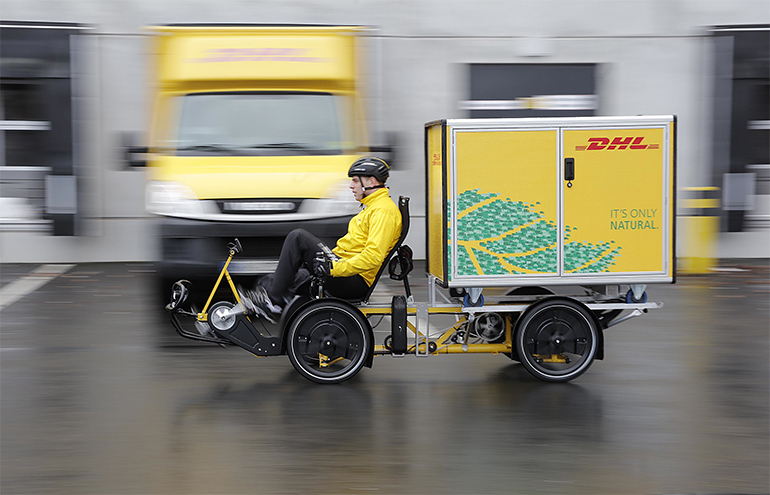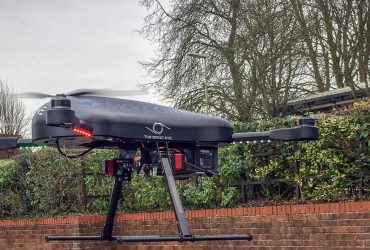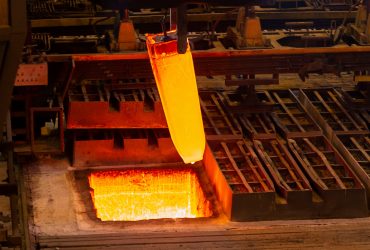
A new player – hydrogen-powered carrier bikes
A preliminary study from a Swedish researcher shows that city traffic may be getting a new player in carrier bikes equipped with fuel cells.
In a fuel cell, chemical energy from hydrogen is converted into electrical energy – notably releasing just water and heat as waste products. Hydrogen-powered vehicles – which emit no exhaust gases and produce far less noise than, say, a diesel generator – are expected to have a bright future, particularly in city traffic.
At Mälardalen University in Sweden, researcher Anders Lundblad carried out a preliminary study backed by AGA, among others, concerning something that may become a new player in city traffic: a carrier bike powered by hydrogen in a fuel cell. In 2016, the preliminary study was submitted to Eforsk, a large conference on fuel cells. The calculations show that nearly half the total transport in large cities could easily be handled using carrier bikes. “A carrier bike can carry up to 500 kg of cargo, though that is probably the upper limit. It is more realistic to ride with 150–200 kg,” says Anders Lundblad. If he can get the financing, the next step is to build a prototype and to test it in city traffic.
The major advantage of the fuel cell is that it is small – but it can be supplied with hydrogen from a large gas cylinder or tank and thus provide lots of energy, for example for refrigeration units or coffee machines if products are to be sold from the carrier bike. If energy were to instead come from a battery, this would require large, heavy batteries. Getting hydrogen is easy, as Anders Lundblad indicates. For instance, hydrogen can be bought in cylinders of 5, 20 or 50 litres, and in Sweden alone there are some 200 distributors of hydrogen.
In many of the large cities around the world, rickshaws play an important role in traffic. This includes rickshaws that run on hydrogen and fuel cells, which was most recently demonstrated by Linde in March during the large “Make the Future” show in Singapore. Here, a rickshaw was introduced with a range of 100 km and a top speed of 25 km/hour.
Hydrogen is well-suited for vehicles
Cars and trucks can also run on fuel cells – and they will!Hydrogen is the lightest of all gases, weighing one-fifth of the weight of atmospheric air. However, hydrogen contains a lot of chemical energy, and if it is sent through a fuel cell, this chemical energy turns to electricity and heat. The only waste product in this process is water vapor. Nevertheless, hydrogen has long since been out of contention as the fuel of the future – instead, the focus has been on vehicles running on batteries. However, despite many years of research, batteries are still very heavy and take time to charge.
This is where hydrogen has a substantial advantage. It can be loaded in minutes and the fuel cells weigh far less than batteries. They can also be connected in series, thus providing much greater power if needed, for example in lorries. In Switzerland, Coop has recently introduced a lorry that runs on hydrogen fuel cells. In both Japan and the US, there are now over 1,000 cars powered by hydrogen, and at the latest economic summit, the World Economic Forum promised a number of large companies that more money would be spent on researching and developing hydrogen as a fuel. Among the companies were Linde and thus AGA. The companies have now come together in what they call the Hydrogen Council, in order to generate progress in research and development. China and Japan in particular are focusing extensively on hydrogen as a fuel for cars, with ambitious goals: as early as 2025, China wants 50,000 hydrogen cars on the streets, and by 2030, this number should increase to 1 million. In Japan, the target is 200,000 cars in 2025 and 800,000 by 2030.
Hydrogen can be made in different ways, including electrolysis, where water is broken down into oxygen and hydrogen. The energy for the process can easily be obtained from sustainable energy sources such as solar cells and wind turbines. The great potential of hydrogen fuel cells extends well beyond vehicles and includes gardening tools, such as lawn mowers. With fuel cells, engine noise and toxic emissions are a thing of the past. Hydrogen is even suitable as a backup for an electric power supply.



